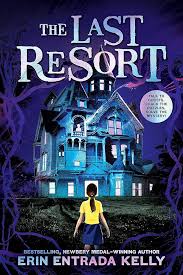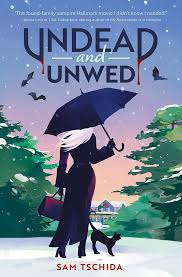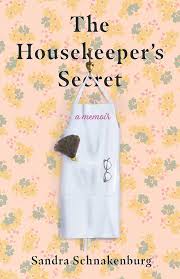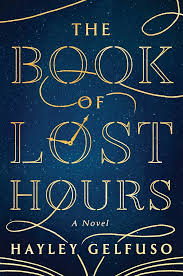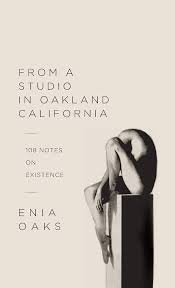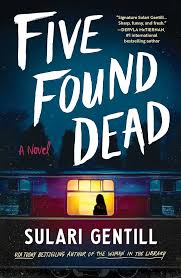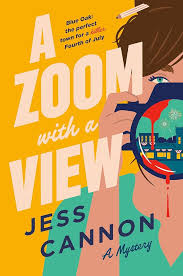
Book: A Zoom with a View
Author: Jess Cannon
Publisher: Dutton
Year: 2026
Rating: 3.5 out of 5 stars
Synopsis : “Leo can’t believe she’s back in Blue Oak. Her small, quirky Texas hometown feels suffocating after trying to make it big as an English professor in New York – especially due to her strained relationship with her overly hair-sprayed mother, Karina. But with Leo’s career in academia in shambles, at least she’s able to work as a photographer for her godmother’s real estate business. And her best friend, Emily, is around to help her navigate through the mess – and maybe force her to reconnect with her old high school boyfriend, Mack.
But while at work, Leo makes a grisly discovery: the dead body of rival real estate agent and social media influencer Chaz. Even worse, Leo and Emily have been secretly running a snarky Reddit page making fun of Chaz’s cringe-inducing advice and duck-faced selfies. When someone Leo loves is accused of the murder, she finds herself flung headfirst into a dangerous investigation, teaming up with a local detective who grew up to be quite attractive. Meanwhile, Karina has been acting stranger and stranger, as if all her hair hides a big secret…”
Review : A Zoom with a View is a cute, sort of cozy, I-just-moved-back-home mystery I love. I extra love that it’s a mystery with a female protagonist who is neither drunk, nor having a mental break. It’s the perfect break from the (ugh) normalized unreliable female narrator trope. We need that. An entire genre of modern mystery books needs that. Jess Cannon has created a fun, hard to put down narrative of twists and turns and fun characters that feel like they stepped right out of your own lived hometown experience, and I genuinely enjoyed reading this book for all of those reasons.
Once I got into the meat of the novel, the plot was easy to follow and the mystery was fun to unravel. I did figure out whodunnit fairly early on, but I will say that the motive was unclear to me until close to the end of the book, so while you may be able to narrow it down early, it doesn’t necessarily take away from the plot. I won’t give the ending away for you, but I will tell you that I thought the villain would have a different motivation and felt the ending suffered a bit from a fairly reductive character. The final reveal felt semi-believable, but I wanted a little more depth than we were given. There’s still time, I think…
Cannon lost me early on, and I want to warn you, reader, that A Zoom with a View has an incredibly slow start and hasn’t been smoothed out in a way that felt easy to read. While it does get much better as you get into the meat of the book, the plot is a bit meta, if you’ll pardon the pun, and this is the real problem with Cannon’s rocky start. In attempting to lay the groundwork for her novel, Cannon has set herself up for some tricky narrative and it doesn’t seem to me that she’s entirely succeeded in making it something everyone will be able to follow. The main character, Leo, runs a snark subreddit centered around someone she went to high school with, Chaz, who as grown up to become a wellness influencer. Leo, and subsequently Cannon, spends a great deal of time explaining the subreddit, running through the cast of characters in Chaz’s universe, and laying out a lot of Chaz jargon. All of this feels true to life, but it’s not written in a way that brings ease to the reader. Snark subreddits aren’t new to me and I still found myself going back and rereading paragraphs, trying to wrap my head around what Cannon was attempting to describe. There’s a sweet spot you find in books where the words flow and the narrative unfurls in your mind and you don’t have to do much work as a reader, and it isn’t really until about halfway through the book that I found that sweet spot here. The first good bit requires you to work for it, and that’s hard for me to argue for. I don’t think it’s necessarily due to the content, though it’s not an easy task to describe a subreddit and an entirely made-up world, but fantasy writers world build all the time. Sometimes it reads easily and sometimes it doesn’t. This was the latter.
Once I got into the swing of things and found the rhythm of A Zoom with a View, I found myself really enjoying how things were unfolding. Like I said, I had the mystery solved pretty early on, but I enjoyed going with Leo to interview each character, seeing how things were happening in Blue Oak and in the broader Chaz snark subreddit world, and seeing my own suspicions confirmed. What really let me down, though, was the ending. I’ve found myself frustrated in recent years by suspense and mystery books that spend 90% of the novel building up to a climax, revealing the villain, and then wrapping the whole book up in the last couple of pages and unfortunately, that’s exactly what A Zoom with a View has done. It’s only in the final few pages of a pretty hefty book that we finally find out the truth behind Leo’s Mom’s secrets and as soon as we learn her secrets, the book ends. It’s a gnarly cliffhanger, if it actually is a cliffhanger. I can’t find any information online about whether this is the first of a series or at least the first of two books and the ending is so nebulous, yet still ties everything up, that I have no idea if it was meant to leave me feeling confused or it was an intentional set-up for the next book. I have to hope it’s a set-up, and I would surely read book two if there were to ever be a sequel, but it felt disjointed and rushed. The ending unraveled fast. I wanted more. So much more. I think much of what I found off-putting about this book would be a non-issue in a sequel now that the groundwork has been done. Ultimately, Cannon is an enjoyable writer who’s created an enjoyable universe and I have questions I’d like to see answered in a second book. Sign me up.
Advice : If you like a well-written mystery that doesn’t feature an unreliable female narrator, I think you should stick out the slow start and give this book a chance! It was fun and enjoyable and once I got into it I found myself swiftly turning the pages. It’s worth the read.

